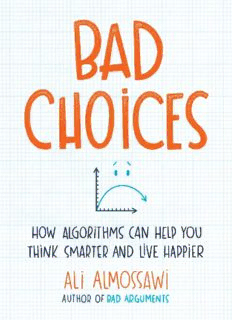
Bad Choices: How Algorithms Can Help You Think Smarter and Live Happier PDF
Preview Bad Choices: How Algorithms Can Help You Think Smarter and Live Happier
ALSO BY ALI ALMOSSAWI An Illustrated Book of Bad Arguments VIKING An imprint of Penguin Random House LLC 375 Hudson Street New York, New York 10014 penguin.com Copyright © 2017 by Ali Almossawi Penguin supports copyright. Copyright fuels creativity, encourages diverse voices, promotes free speech, and creates a vibrant culture. Thank you for buying an authorized edition of this book and for complying with copyright laws by not reproducing, scanning, or distributing any part of it in any form without permission. You are supporting writers and allowing Penguin to continue to publish books for every reader. Creative and art direction by Ali Almossawi Illustrations by Alejandro Giraldo Library of Congress Cataloging-in-Publication Data Names: Almossawi, Ali. Title: Bad choices : how algorithms can help you think smarter and live happier / Ali Almossawi. Description: New York : Viking, 2017. | Includes index. Identifiers: LCCN 2016056684 (print) | LCCN 2016058049 (ebook) | ISBN 9780735222120 (hardcover) | ISBN 9780735222236 (ebook) Subjects: LCSH: Decision making–Mathematical models. | Sequential analysis. Probabilities. | Algorithms. Classification: LCC QA279.4 .A6275 2017 (print) | LCC QA279.4 (ebook) | DDC 518/.1–dc23 LC record available at https://lccn.loc.gov/2016056684 Version_1 FOR FATIMA ALSO BY ALI ALMOSSAWI TITLE PAGE COPYRIGHT DEDICATION EPIGRAPH PREFACE INTRODUCTION ALGORITHMIC THINKING IN EVERYDAY LIFE 1. MATCH THOSE SOCKS 2. FIND YOUR SIZE 3. POP TO THE SHOPS 4. BRING HIM HOME 5. SORT THAT POST 6. BE MORE HIP 7. UPDATE THAT STATUS 8. GET THE JOBS DONE 9. FIX THAT NECKLACE 10. LOCATE THAT BOX 11. FILL THOSE SHELVES 12. NAVIGATE THOSE AISLES FINAL THOUGHTS ACKNOWLEDGMENTS TO LEARN MORE RATES OF GROWTH INDEX YOU CAN SWIM ALL DAY IN THE SEA OF KNOWLEDGE AND NOT GET WET. —Norton Juster, The Phantom Tollbooth PREFACE D id you know that Richard Feynman started developing the equations that won him the Nobel Prize after seeing someone throw a plate in the air? Or that John von Neumann modeled parts of his electronic computer on a friend’s idea about how memories are stored in the human brain? Or that the sight of a kicking and screaming orangutan at the zoo led Charles Darwin to his big idea? What Feynman, von Neumann, Darwin, and others have in common is that they see physics and mathematics and science everywhere, way beyond the confines of their laboratories. Even if you’re not gunning for a Nobel Prize, you probably do things in your everyday life that can be modeled as algorithms. In fact, you apply them on a daily basis to solve various problems: finding pairs of socks in a pile of clothes, deciding when to go to the grocery store, determining how to prioritize your tasks for the day, and so on. An algorithm is a series of unambiguous steps that achieves some meaningful objective in finite time. The series might begin with some input and is expected to produce an output. Those are an algorithm’s characteristics. What’s fascinating is that Babylonian tablets from around 1800 to 1600 BCE reveal that ancient Babylonians wrote down their procedures for determining things like, say, compound interest or the width and length of a cistern given its height and volume using algorithms. That is to say, their procedures were made up of an unambiguous series of steps; they had some input, some output, they eventually terminated and they were useful. Algorithms can thus be found in the works of various contributors to mathematics over the centuries. After the advent of computers, these characteristics have proved crucial because they allow computers to carry out tasks in a way that is predictable. Despite the importance of algorithms in our lives, texts on the subject tend to focus largely on intricate details—the “how”—while perhaps ignoring the more practical lessons of those algorithms that make them appealing. The seemingly
Description: